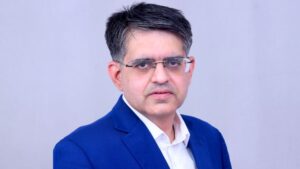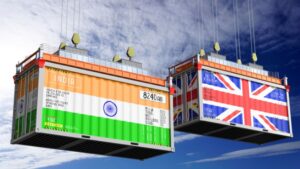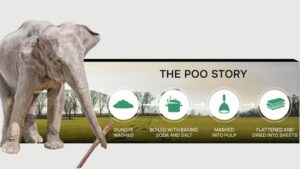
Nahar Group, a stalwart in the textile industry with 75-year legacy, boasts an impressive infrastructure comprising approximately one million spindles and extensive weaving, processing, knitting and garmenting capacities. As a vertically integrated plant, Nahar not only manufactures an extensive range of textile products but also controls every stage of the production process, ensuring a harmonious blend of efficiency, sustainability and top-notch quality. Nahar has a weaving capacity of 60 million metres per annum, empowered by 515 cutting-edge technology looms. Its fabric processing produces 50 million metres annually, offering an array of options from dyeing and printing to yarn dyeing and RFD. Utilising state-of-the-art machinery from Europe and Japan, the company excels in producing fabrics such as 100 per cent Cotton and Cotton blends, Aramid and Viscose blends with a GSM range from 80-350 gm.
The company has multiple spinning facilities with the latest technology having installed capacity of 2,64,000 spindles and 8200 rotors in count range Ne 6/1 to Ne 50/1 and producing wide variety of yarns including ring slub, multicount slub, eli twist, spandex, polyester/modal yarns. In a candid interview with Abhinav Oswal, Executive Director of Nahar Group, he discussed key highlights including the company’s evolution from a small woollen worsted spinner to a diversified conglomerate, its emphasis on innovation and sustainability, strategic priorities for future growth and innovation and more.
AR: The Nahar Group is completing 75 years of its inception. How do you see the journey from a small woollen worsted spinner and hosiery manufacturer to a leading textile giant?
Abhinav: Our journey, which began in 1949 under the leadership of late Vidya Sagar Oswal, has been a remarkable one. Starting as a small woollen spinner and hosiery manufacturer, the company has evolved into a diversified conglomerate over the course of 75 years. With a substantial foothold in both the woollen and cotton industries, we have established ourselves as front runners in the cotton textiles industry. Our current infrastructure boasts around one million spindles and extensive capabilities in weaving, processing, knitting and garmenting capacities.
Moreover, Nahar Group’s successful diversification into new areas, such as Real Estate Development, Sugar Manufacturing, BOPP films and Power Generation, including Solar Power, Wind Mill and Non-Conventional Co-Generation Power Plants, showcases its adaptability and forward-thinking approach. The group’s flagship companies – Nahar Industrial Enterprises Ltd. (NIEL), Oswal Woollen Mills Ltd. (OWM), Nahar Spinning Mills Ltd. (NSML), and Monte Carlo Fashions Ltd. – have played crucial roles in its journey of success. I am confident that Nahar Group’s journey not only underscores its resilience and success in the textile sector but also its ability to adapt and explore new avenues, ensuring a sustainable and dynamic business model. As we celebrate the group’s 75th year of inception, it marks a significant milestone, symbolising our achievements and setting the stage for continued growth and innovation.
AR: Global as well as Indian brands and retailers are continuously looking for innovations and new developments at the level of raw material, shades, finishes and uses. How much thrust do you have on new developments?
Abhinav: At Nahar, our approach to innovation is a synergistic combination of human ingenuity, quality materials, state-of-the-art machinery and refined processes. Our commitment to providing good quality products while upholding social responsibility is evident in our aim to continuously innovate products and processes. The company places a strong emphasis on sustainability, focusing on the production of environmentally friendly raw material products. Some of the sustainable materials include 100 per cent Organic cotton, Recycled cotton, Recycled polyester, BCI cotton fibre and Recycled Lycra/spandex, amongst others.
Our dedication to environmental responsibility extends to our production processes. Initiatives like salt-free dyeing and other environmentally friendly initiatives minimise our environmental footprint and we are seeking new avenues for dyeing innovation. This demonstrates our commitment to sustainable practices. Looking ahead, our focus is on the creation of superior technical fabrics. We are incorporating high-performance materials such as aramids, known for their exceptional strength and heat-resistant properties. Additionally, our emphasis on flame retardant finishes further reinforces our commitment to developing fabrics with enhanced safety features.
| For Us, Timely Delivery And Customer Satisfaction Are Paramount. We Ensure That Customers Receive Products Promptly, Accompanied By Comprehensive Assistance To Meet Their Needs. |
With a rich legacy spanning 70 years in the cotton industry, we have acquired extensive expertise. Our commitment to innovation is evident in our recent and upcoming major developments, where we’re integrating the best of synthetic and cotton blends to impart functional properties while maintaining comfort.
By leveraging a combination of skilled human resources, quality materials, advanced machinery and refined processes, we continue to position ourselves as a front runner in the textile industry, setting new standards for fabrics with a focus on both functionality and comfort.
AR: What all different global and Indian clients are mainly associated with you and how do you serve them best in terms of quality and service?
Abhinav: Our extensive partnerships with leading retailers across the US, Europe, the UK and India speak volumes about our global presence and unwavering commitment to delivering top-notch products. This also reflects our versatility in catering to various markets and consumer preferences.
In the US, we proudly partner with esteemed names like Carhartt, Abercrombie & Fitch, American Eagle, Tommy Hilfiger, Calvin Klein, Polo Ralph Lauren and many others. Across Europe, our retail partners include Decathlon, Esprit, C&A, s.Oliver, Bestseller, amongst others. In the UK, we collaborate with brands such as Next and M&S (Marks & Spencer). And in India, our retail partners include renowned names like Aditya Birla, Raymond, Reliance Trends, Lifestyle, Max, Arvind Brand, Pantaloons, Indian Army, ITBP (Indo-Tibetan Border Police) and so on.
AR: Bangladesh, Latin America, Egypt and Vietnam are big clients of Indian fabrics. How do you see your client base in these countries and what other markets are on your radar?
Abhinav: We recognise the significant potential in exploring markets like Bangladesh, Latin America, Egypt and Vietnam for the Indian fabric industry. When we assess the current scenario, the share of India’s woven fabric exports to these countries presents a considerable opportunity. For instance, in terms of value, India’s exports to Bangladesh, Egypt and Vietnam stand at US $ 579 million, US $ 69 million and US $ 31 million respectively. In comparison, China’s share in these nations is substantially higher at US $ 2,853 million, US $ 282 million and US $ 2,742 million. Considering the vast gap in these figures, it is evident that there is untapped potential for the Indian fabric industry in these markets. Still, considering our emerging focus on technical fabrics, our sights are set particularly on the European market. This direction aligns seamlessly with our Prime Minister’s vision for greater focus on the technical textile market.
| 2024 Our aim is to be coal-free by 2024, surpassing not only industry standards but also the expectations set by international brands, reaffirming our dedication to a greener future. |
AR: Being the fourth generation leadership, what is the major difference you found in terms of operations and thought process? How did you bridge the gap and what have you introduced to stay ahead?
Abhinav: Rooted in the enduring principles and ethics that define our family legacy, I’ve seen our business operations and thought processes evolve in response to the changing times. Today, the textile industry faces new challenges and demands, prompting us to continually upgrade technology and introduce innovative solutions. Our commitment to the textile business remains unwavering, but the methods to uphold this commitment have evolved.
To stay ahead, we have introduced technological advancements, such as the integration of IoT devices into our operations. This not only enhances efficiency but also aligns with the contemporary industry standards. The introduction of new products and a strategic focus on technical fabrics reflect our commitment to staying at the forefront of industry trends. Simultaneously, we embrace the need for innovation and technology, recognising that adapting to the present landscape is vital for sustained success. Our focus on new products, technical fabrics and leveraging cutting-edge technology stands as a testament to our commitment to providing stability to both our shareholders and stakeholders, ensuring continued success and growth of our textile business.

AR: How is Nahar Group stepping up its efforts towards sustainability in textile operations, especially considering its focus on non-conventional energy generation like wind turbines in Tamil Nadu and Karnataka and solar power projects in Rajasthan?
Abhinav: I’m proud to say that Nahar Group is confidently establishing itself as a leader in sustainability. Driven by self-set goals instead of adhering to external benchmarks, our commitment to sustainability goes beyond merely meeting the standards set by international brands.
Our aim is to be coal-free by 2024, surpassing not only industry standards but also the expectations set by international brands, reaffirming our dedication to a greener future. The strength of this commitment is evident in the diverse energy generation initiatives we’ve undertaken at Nahar. Notably, Nahar Industrial Enterprises Limited alone produces a significant 25.8 MW of electricity, with contributions from our sister companies and wind turbines in Madhya Pradesh and Karnataka, reducing our dependence on conventional power sources by an impressive 12 per cent.
Our commitment to sustainability aligns seamlessly with the United Nations’ 17 Sustainable Development Goals established in September 2015. We are not only focused on sustainable energy goals. Still, we are actively involved in creating sustainable communities, promoting good health, quality education, gender equality, fostering good jobs and economic growth and emphasising on responsible consumption. For us at Nahar, sustainability is not just a corporate responsibility; it’s a philosophy woven into the fabric of its operations, creating a better life for everyone, everywhere.
Nahar’s commitment to fostering green ethos is a cornerstone of our operations. We’ve taken significant strides across various fronts to uphold this commitment. One notable initiative is the adoption of green chemistry in our processing plants, prioritising the use of less hazardous dyes and chemicals to minimise environmental impact. Additionally, we’re deeply involved in social responsibility efforts, supporting institutions in Giaspura, Thakkarwal and Ludhiana colleges. Collaborating with the Punjab Pollution Control Board, we’ve planted over 8000 trees in three years. Our transportation fleet reflects our commitment to a sustainable environment. By transitioning to Compressed Natural Gas (CNG), we’ve not only saved 48,750 litres of diesel annually but also significantly reduced CO2 emissions. Furthermore, replacing diesel-based forklifts with electric battery-based alternatives has further reduced both diesel consumption and CO2 emissions.
When it comes to packaging, we’re actively working to reduce plastic consumption. Nahar Fabric alone achieved a remarkable 42.2 per cent reduction in plastic usage in the last year. This comprehensive approach to sustainability positions Nahar as a trailblazer, setting ambitious targets and leading the way toward a greener, more environmentally conscious future.
| We actively embrace technological advancements to reduce energy consumption. We were the first to use salt-free dyeing to underscore the group’s dedication to sustainable practices. Water recycling initiatives, alongside the ambitious target of achieving a ZERO COAL footprint within the year, showcase our holistic approach to responsible resource usage. |
AR: Where do you see the company in the short-term and long-term horizon and how you are going to achieve it?
Abhinav: Our mission isn’t just about leading the textile industry in the country; it’s about implementing specific short-term and long-term strategies to achieve this goal. In the short term, our primary focus lies in developing value-added fabrics and specialised technical products, such as flame retardant and antistatic materials, which are currently not widely prevalent in India. This strategy not only underscores our commitment to innovation but also aligns seamlessly with our Prime Minister’s vision of ‘Made in India’. We also fully support the 5F vision – farm to fibre; fibre to factory; factory to fashion; fashion to foreign of PM Modi.
Looking ahead at the long-term strategy, by prioritising relationships based on shared values and sustainability principles, we aspire to create a network with our domestic and export customers that goes beyond transactional business, fostering long-term partnerships built on mutual understanding and a commitment to a more sustainable future.
This multifaceted approach demonstrates our commitment to elevating India’s standing in the global market while meeting the unique requirements of our domestic audience.






